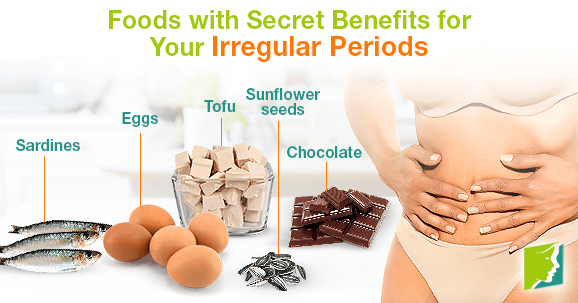Irregular periods are an inconvenience that most women experience at some point in their lives - and almost certainly during the years just prior to menopause. Defined as any menstrual activity that alters dramatically from a 28 day cycle with around five days of bleeding, irregular periods happen during perimenopause because of changes of estrogen and progesterone production in the body as it prepares to cease menstruation altogether. However, what you eat can play a significant role in regulating these hormone levels. These foods offer benefits to regulate periods.
Sunflower Seeds
Sunflower seeds are a fantastic source of vitamin E, which is considered the "reproductive vitamin" due the benefits it provides to menstrual health. Sunflower seeds contain 7.4 mg of vitamin E per one-ounce serving. Other foods containing substantial proportions of vitamin E include sunflower oil, spinach, broccoli, and almonds.
Tofu
Tofu and other soy products (e.g., soymilk) contain phytoestrogens. Phytoestrogens have been found to benefit irregular periods due to their estrogenic action, which helps restore estrogen levels lost in the body during menopause and regulate the effects of hormone-driven symptoms.
Sardines
Sardines are an excellent source of omega-3, which is a fatty acid that has numerous health benefits, not least in regulating periods. Omega-3 enhances blood circulation and thus boosts the tiny blood vessels in the ovaries to stimulate more regular menstruation. Salmon is another notable omega-3 source or, if you are not a fan of seafood, fish oil supplements are widely available from wholesalers and online retailers as a means of incorporating fatty acids into your diet.
Eggs
Eggs are a valuable source of protein that can boost fertility and promote hormonal balance to counter dwindling estrogen and progesterone production during menopause. The yolk is particularly nutritious for this.
Dark Chocolate
As well as having a deliciously decadent flavor, dark chocolate (i.e., 70% cocoa solids) contains flavonoids, which have an estrogen-like function and improve circulation by reducing platelet clumping in the bloodstream, thus enhancing blood flow in the ovaries. Many women experience cravings for sweet treats at certain points in their menstrual cycle, so eating dark chocolate satisfies this want in a way that is also beneficial to your hormonal levels.
It's important to remember that a generally balanced diet is key to attaining a healthily functioning body. Damaging dietary habits, such as excessive alcohol and junk food consumption, crash diets, and lack of water, are all likely to intensify irregular periods. The listed foods boost overall health as well as being specifically helpful in regulating the menstrual cycle, and so they'll most likely invoke general benefits, such as clearer skin, higher energy levels, and a reduction in other menopause symptoms derived from hormone imbalances, like loss of libido.
Sources
- National Institutes of Health. (2013). Vitamin E. Retrieved February 10, 2014 from http://ods.od.nih.gov/factsheets/VitaminE-HealthProfessional/
- National Women's Health Network. (2012). Herbs and Phytoestrogens. Retrieved February 10, 2014 from http://nwhn.org/herbs-and-phytoestrogens
- Patisaul, H.B. & Jefferson, W. (2010). The pros and cons of phytoestrogens. Frontiers in neuroendocrinology, 31(4), 400-419. doi: 10.1016/j.yfrne.2010.03.003




